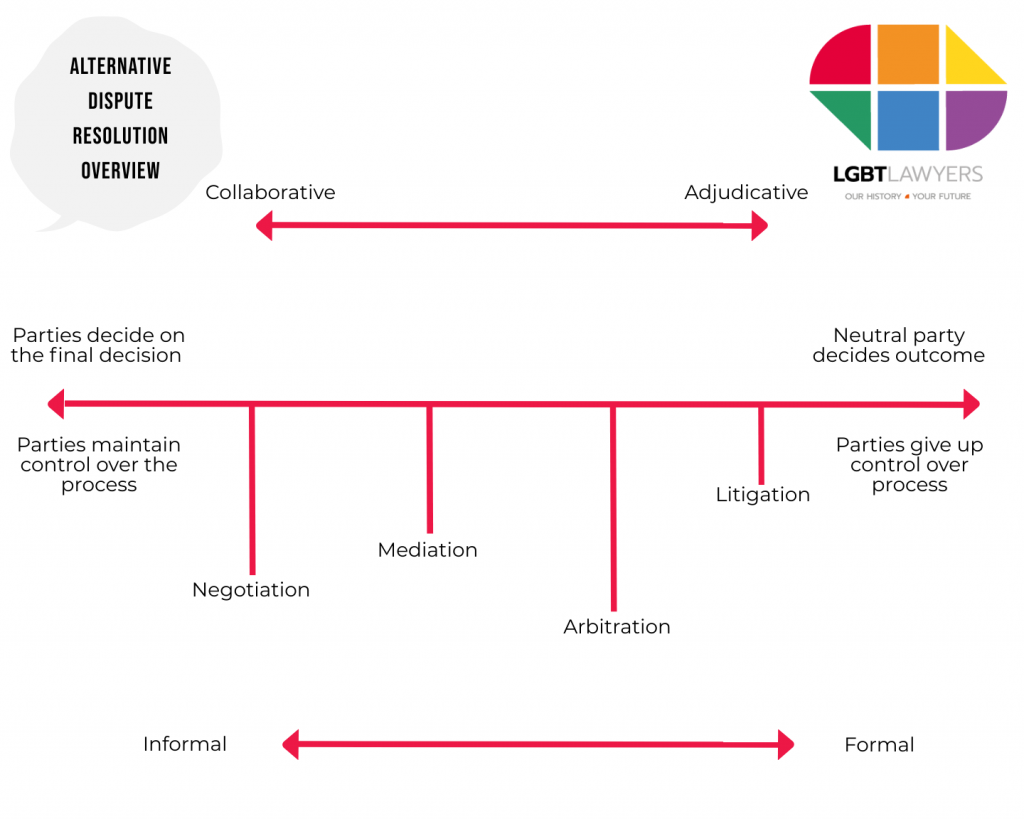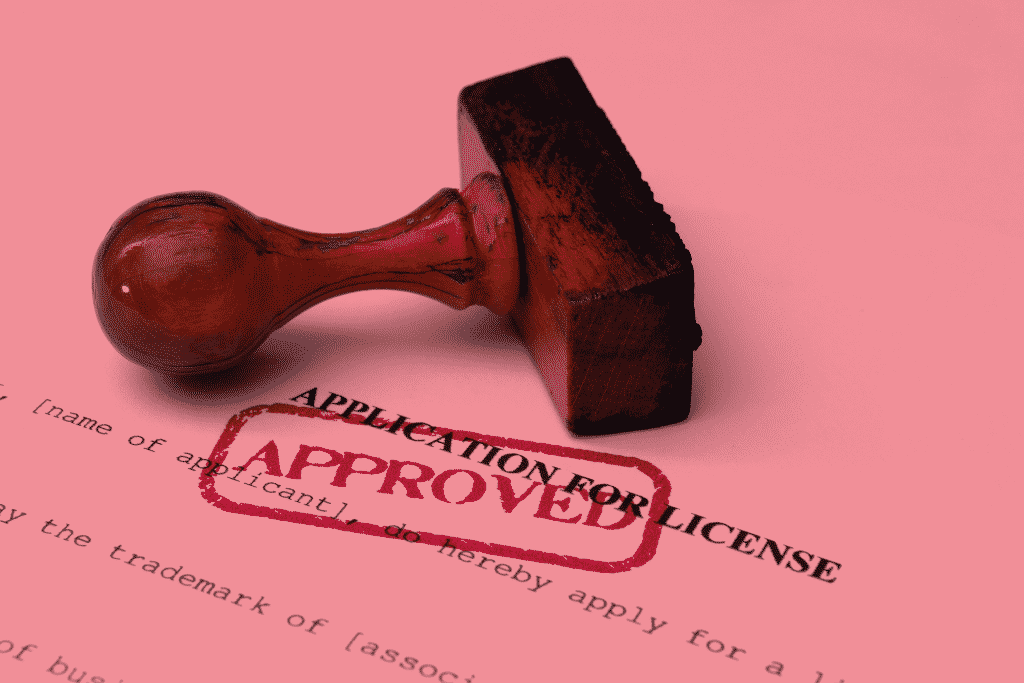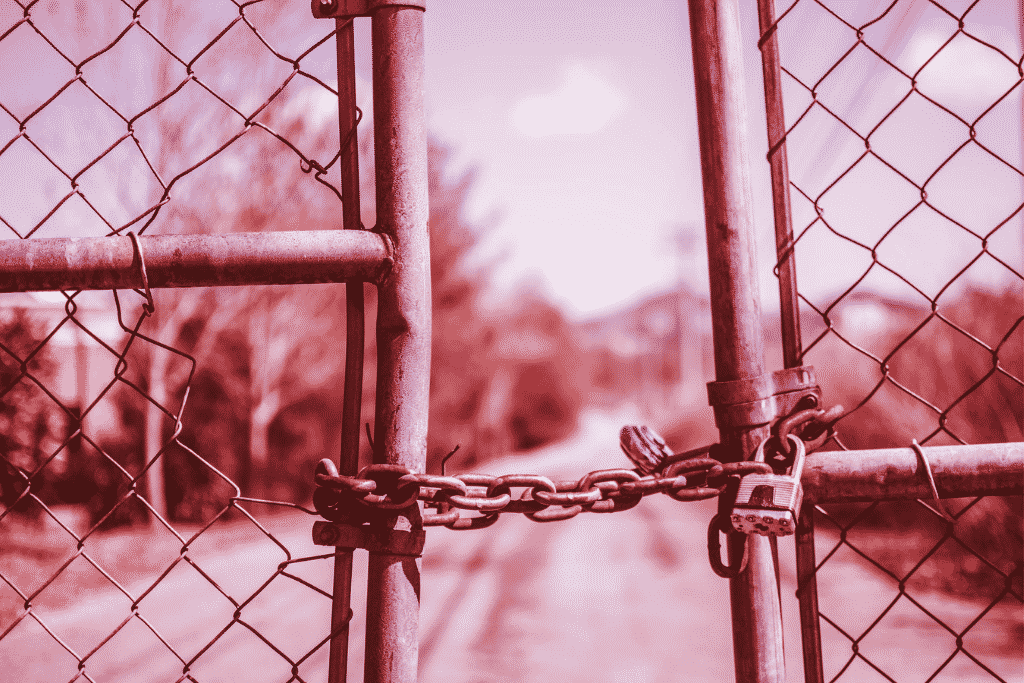Home / Legal Areas / Civil Litigation / Alternative Dispute Resolution
Alternative Dispute Resolution
Alternative dispute resolution offers another way to settle a claim outside of court. Undoubtedly, court proceedings are often expensive, stressful and time-consuming, not to mention wasteful if things do not go your way. Importantly, our network of LGBT dispute resolution lawyers will help assist you in settling your case outside of court.
Call Today
020 3795 9020
Our Email
INFO@LGBTLAWYERS.CO.UK
Our Address
39 CHURCH ROAD, HOVE, BN3 2BE
Contents for Alternative Dispute Resolution
1. What is Alternative Dispute Resolution?
4. How a Lawyer Can Help During ADR
What is Alternative Dispute Resolution?
The process of alternative dispute resolution is commonly known as ADR. ADR is another way of settling a dispute besides going through court.
It should be noted, methods of ADR can be used alone, and they can be used in succession with each other, or alongside court processes to bring a claim quicker. It can be and cheaper than if pursuing a claim through court. Therefore, alternative dispute resolution is most often used during employment disputes (at the employment tribunal for example).
In addition, it is also commonly used during family matters such as divorce. Furthermore, it is frequently used for civil litigation claims. Above all, the decisions made during alternative dispute resolution may not be legally binding depending on the method of ADR used.
The 3 Main Types of ADR
Mediation and Conciliation
Mediation and conciliation are two separate forms of alternative dispute resolution.
Above all, mediation and conciliation are normally used during employment disputes. Additionally, they are both voluntary. Therefore, both the employee and employer must agree before it can take place.
Furthermore, the outcomes of mediation and conciliation are also voluntary. This means that even if a settlement is agreed upon during the process, neither side is legally bound to accept it.
As a result, mediation is especially common in family matters such as divorce. This is because couples normally need to prove they have gone through mediation before taking further steps.
Pros – It is quick and cheap. Also, it is widely understood and accepted. It promotes mutual resolution. Finally, it has a high rate of success.
Cons – It will not work if the trust is broken between parties. In addition, the outcome is not binding.
Arbitration
Arbitration invites a third party. Moreover, the third-party normally a judge makes a binding decision on a dispute. This is done outside of the court process.
Importantly, the arbitration will normally be used after mediation or conciliation has taken place. Both sides can agree to accept that any outcome the arbitrator decides on is binding.
It should be noted, both sides will normally agree to what the issues in the dispute are by creating terms of reference.
Lastly, the arbitrator will then use the terms of reference to consider the evidence from both sides. Furthermore, the arbitrator makes a decision. The decision made cannot be challenged afterwards.
Pros – The process is quick and cheap. In addition, the outcome is legally binding. It can be noted, the process is confidential.
Cons – The outcome can not be challenged. Also, the enforcement of an outcome can be difficult.
Adjudication
Adjudication is used primarily for commercial disputes. Additionally, it is commonly used in construction issues.
First and foremost, the process is vastly similar to arbitration where a third party adjudicator is jointly appointed by both sides to make a binding decision.
Importantly, the key difference between adjudication and arbitration is that the outcome of adjudication can be overturned through litigation, but it’s not common to do so.
Pros – Adjudication is quick and cheap. Above all, it is more flexible than court.
Cons – It is unsuitable for complex claims. Also, it is not widely used outside of construction disputes
Alternative Dispute Resolution Overview

Key Benefits of Using ADR
1. Speed of Resolution
ADR is typically much faster than traditional court routes. For example, mediation can be arranged in weeks. Also, an outcome agreed in a matter of days. Moreover, litigation can take months to years to receive a judgment.
2. Cost Reductions
As the processes are shorter than going to court, less time, and money is spent preparing documents. In addition, it also takes less time to prepare evidence.
3. Confidentiality
Sensitive disputes can be settled out of the public eye. Moreover, it means people can avoid media coverage and negative press releases.
4. Lower Anxiety
Court processes can drag on for months and years. Also, in employment matters, in particular, this can be draining on the individuals involved. Especially, whilst they wait to give evidence, and for an outcome to be reached. ADR can avoid all of this.
5. Flexibility of Outcomes
The outcomes of some forms of ADR are not constrained by the court. Furthermore, thee outcomes can be tailored to both sides involved in the dispute.
How a Lawyer Can Help During ADR
Most forms of complex dispute management can benefit from professional help, including alternative dispute resolution.
Having a litigation lawyer on your side during ADR will help you understand how strong your case is. In addition to this, they can help you to understand how credible the other side’s evidence is.
Moreover, this will in turn help you understand how fair any offers to settle made through alternative dispute resolution are. As well as whether or not you should accept the offers.
If you choose to go ahead with arbitration or adjudication not understanding that the outcome is binding, you cannot use this as a defence once a decision is made. However, having a lawyer involved in your dispute can avoid this happening in the first instance.
NEED AN ALTERNATIVE DISPUTE RESOLUTION LAWYER NOW?
Get in touch today by giving us a few details and a brief outline of your matter. We will put you in touch with an LGBT Lawyer.
* indicates that a field is mandatory. Please note all enquiries are handled by our referral partner Britton and Time Solicitors and that by submitting an enquiry, you are providing your permission for your contact and case details to be passed on to Britton and Time Solicitors.
OTHER LEGAL AREAS
CRIMINAL LITIGATION
DISCRIMINATION
EMPLOYMENT DISPUTES
FAMILY
IMMIGRATION
LANDLORD & TENANT
WILLS & PROBATE
Civil Litigation: LASTEST BLOGs and insights

Data Breach Compensation | How To Make A Claim
In the UK, recent reports presented that there were 1,767 publicly reported data breaches in 2021. In total, these data breaches amounted to 18.8 billion personal data leaks. As a result of data breaches becoming more prominent, we have explained everything you need...
Alternative Dispute REsolution Not Right For Your Situation?
Haven’t been able to find the information or solution you were looking for? Here are all the civil litigation services on offer from the LGBT Lawyers network.

PROFESSIONAL NEGLIGENCE

PROFESSIONAL NEGLIGENCE

LICENSING REVIEW
The LGBT Lawyers Difference
At LGBT Lawyers we tailor our legal services specifically to the LGBT community and everything that being LGBT entails. As an LGBT individual you deserve legal advice that is free from any attitude or judgement. Our legal partner Britton and Time Solicitors is a regulated and LGBT-friendly firm that will ensure your legal requirements are met.
LGBT Lawyers earnt its fantastic reputation from its fearless commitment to Our clients’ cases
Call Today
020 3795 9020
Our Email
INFO@LGBTLAWYERS.CO.UK
Our Address
39 CHURCH ROAD, HOVE, BN3 2BE
WE can put you contact with an alternative dispute resolution Lawyer Now
Please give us a few details and a brief outline of your matter. We will put you in touch with an expert LGBT Lawyer.




